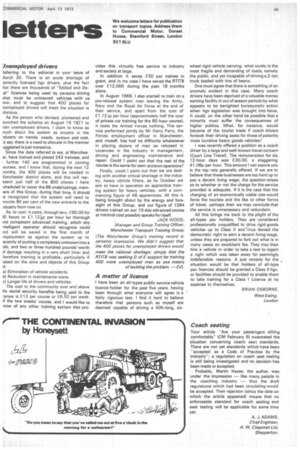Themployed drivers
Page 47

If you've noticed an error in this article please click here to report it so we can fix it.
ieferring to the editorial in your issue of /larch 30. There is an acute shortage of :orrectly licensed hgv drivers, plus the fact hat there are thousands of -fiddled and Meal" licences being used by persons driving vhat must be uninsured vehicles with us iow, and to suggest that 400 places for inemployed drivers will meet the situation is iilarious.
As the person who devised, pioneered and unched the scheme on August 16 19,71 to rain unemployed drivers, I claim to know as nuch about the system as anyone in the tdustry on trends, needs, system and cost. 'o say there is a need to allocate in the manner uggested is just nonsence.
Since the date referred to we, at Manchesar, have trained and placed 243 trainees, and further 140 are programmed in coming .ourses, and I know that, during the next 12 rionths, the 400 places will be needed in anchester district alone, and this will repesent just half of the 800 places I have cheduled to cover the 88 undertakings, memers of this Group, during that time. It should e recognized that the system will need to irovide 80 per cent of the new entrants to the ridustry frorn now on.
As to cost: it costs, through levy, €90,00 for 10 hours or £1. 124-p per hour for thorough Ind competent advanced training, which any ltelligent operator should recognize could Ind will be saved in the first month of mployment as against the system up to ecently of putting a completely unknown into a :ab, and two or three hundred pounds' worth rf damage resulting in a very short time: and herefore training is profitable, particularly if iased on the aims and objects of this Group a) Elimination of vehicle accidents.
6) Reduction in maintenance costs.
c) Longer life of drivers and vehicles,
The cost to the community over and above he social security benefits being paid to the einee is £13 per course or £6.50 per week if the two weeks' course, and I would like to now of any other training system that pro
vides this virtually free service to industry and society at large.
In addition it saves €50 per trainee in grant, and in my case I have saved the RTITB over €12,000 during the past 18 months alone.
In August 1969, I also started to train on a pre-release" system men leaving the Army, Navy and the Royal Air Force at the end of their service, and apart from the cost of £1.12 J.-p per hour (approximately half the cost of private car training for the 80-hour course), it costs the Armed horces nothing. This service performed iointly by Mr Harry Parry, the Forces employment officer in Manchester, and myself, has had no difficulty whatsoever in placing dozens of men so released in vacancies in the industry in management, driving and engineering maintenance and repair. Could I point out that the rest of the course is the same for own-account operators?
Finally, could I point out that we are dealing with another critical shortage in the industry, heavy vehicle fitters, as by October we aim to have in operation an apprentice training system for heavy vehicles, with a commencing figure of 48 apprentices, All this is being brought about by the energy and foresight of this Group, and our figure of 1364 drivers Leined on our 10-day advanced course at minimal cost possibly speaks for itself.
JACK WOOD, Manager and Group Training Officer, Manchester Transport Training Group.
The Manchester Group's training record is certainly impressive. We didn't suggest that the 400 places for unemployed drivers would meet the national shortage; simply that the RTITB was seeking D of E support for training 400 more unemployed men as one means of tackling the problem. — Ed],
























































































































